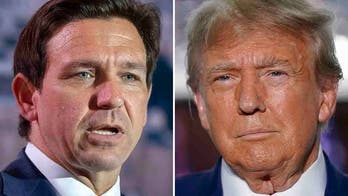McALLEN, Texas – It will be at least two months before any Mexican truckers pass safety, English and national security checks and win approval to cruise middle America's highways under a long-awaited cross-border trucking agreement between the two countries, U.S. Department of Transportation officials said Thursday.
And even then it remains to be seen how many Mexican trucking companies will actually join the three-year pilot program that balances national security concerns and free-flowing commerce at the border. A Mexican trucking association suggested it would not be many because the temporary nature of the program would not make the investment worthwhile.
Mexican truck drivers in the program will face more scrutiny than thousands of trucks that cross the border daily because they will now be allowed to leave the narrow border trade zones and head for destinations deeper inside the U.S. But criminal activity has been a problem for years even within the U.S. government's strictest trusted carrier programs. Drug trafficking organizations have smuggled tons of drugs inside trucks driven by approved truckers coming from inspected and certified facilities inside Mexico.
Some members of Congress have decried the program's economic and security risks and introduced legislation to limit it.
Opposing strong reactions suggests the contested provision of the North American Free Trade Agreement remains controversial even though Mexican trucks have operated in trade zones near the border for years and a limited number took part in a two-year demonstration program.
"The new agreement will probably not open us any more to criminal enterprise than we are now," said David McIntyre, a homeland security expert and vice president for academics at National Graduate School of Quality Management. "But we have a big problem with criminal enterprise right now."
U.S. Rep. Henry Cuellar, a Texas Democrat who serves on the House Homeland Security Committee and whose district includes Laredo port of entry, said that when the Bush administration tried a pilot program for the cross-border trucks, only a few carriers participated.
"If anybody expects huge lines of Mexican trucks to come in across the border revving their engines, that's not going to happen that way," Cuellar said. "It's expensive for a lot of those trucking companies ... because they have to meet so many requirements on this side."
Cuellar said he also expected that lawsuits and attempts to block implementation funding from other members of Congress could delay the program further.
U.S. Rep. Duncan Hunter, a San Diego-area Republican and a hardliner on illegal immigration, introduced legislation Wednesday to make sure the program cap stays at three years and does not evolve into something permanent.
"This administration and its predecessor have shown unrelenting interest in opening the southwest border to unrestricted vehicle traffic from Mexico despite legitimate safety, security and economic concerns," he said.
James Clark, director of the San Diego Regional Chamber of Commerce's Mexico Business Center, said security concerns are unfounded because U.S. and Mexican trucks get the same degree of scrutiny and inspection.
Clark rejected concerns that Mexican drivers won't understand English, noting that language proficiency has long been required to drive a truck in the United States.
"Aeromexico pilots speak Spanish, too, but they land planes at LAX," he said.
Before anything moves ahead, the Department of Transportation's inspector general will have to complete an audit, started in April, on the program and show it to Congress. The inspector general did not return a call seeking comment Thursday.
In recent years, the Federal Motor Carrier Safety Administration has hired and trained nearly 300 inspectors, auditors, investigators and supervisors to work along the southwest border, according to previous audits. An additional 345 state inspectors work the border as well, subsidized by the federal government.
The enrollment process for Mexican trucking companies begins with filling out an application and paying a fee. The company making the application and any drivers who will participate will submit to national security and criminal background checks, which will be conducted by the Justice Department and Department of Homeland Security.
One difference for Mexican truck drivers who for years have hauled loads through international ports of entry with only a border crossing card will be that they will need a passport and visa to take their trucks beyond the trade zone, said Jenny Burke, a CBP spokeswoman.
Inspectors will check out the trucks for safety violations, verify the drivers' qualifications and administer oral English-proficiency exams. The first batch of approved Mexican trucking companies is expected to take two months, according to the Department of Transportation.
The U.S. government will pay for and install electronic monitoring devices in all Mexican trucks used in the program.
The agreement signed Wednesday is for a three-year pilot program. During that period, the government will track its progress.
Mexico's National Cargo Transportation Association, or Canacar, said "the only thing this situation provides is maintaining uncertainty among Mexican investors."
The truckers' association predicts that few Mexican transport companies want or will be able to participate in the program.




